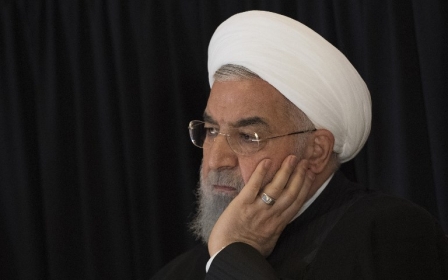Facebook purges dozens of Iran-linked accounts aimed at 'sowing discord' in US
Facebook has taken down dozens of accounts it says were linked to an Iranian effort to influence US and British politics through posts about immigration and race relations, among other charged topics.
The social networking giant said on Friday that it had identified 82 pages, groups and accounts that originated in Iran and violated a policy on coordinated "inauthentic" behaviour.
The account owners tried to hide their identities by passing themselves off mostly as US citizens, and in a few cases as British citizens, said Facebook's head of cybersecurity policy, Nathaniel Gleicher.
Posts on the accounts or pages, which included some hosted by Facebook-owned Instagram, focused mostly on "sowing discord" via discussions on highly divisive issues, such as race relations, police brutality and US President Donald Trump.
A number of the accounts and pages dated back several years, but most of the online activity took place in the past year, according to Facebook.
The purge involved 30 pages, 33 accounts and three groups on Facebook, as well as 16 accounts on Instagram.
One of the pages had slightly more than a million followers, with the majority of the engagements taking place over the past year, the company said.
Sample posts shared by Facebook included inflammatory comments about Trump, British Prime Minister Theresa May and the controversy around freshly appointed US Supreme Court Justice Brett Kavanaugh.
The Digital Forensic Research Lab at the Atlantic Council, a Washington, DC-based think-tank, analysed the activity on 10 Facebook pages and 14 Instagram accounts, 12 hours before they were taken down.
"These accounts masqueraded primarily as American liberals, posting only small amounts of anti-Saudi and anti-Israeli content interspersed within large volumes of divisive political content such as race relations, police brutality, and US President Donald Trump," it found.
Among the pages that were taken down, a Facebook page called "I Need Justice Now" had logged more than 13 million video views, while another called "No Racism No War" had garnered almost 500,000 followers, the council said.
These accounts masqueraded primarily as American liberals, posting only small amounts of anti-Saudi and anti-Israeli content
-Atlantic Council's Digital Forensic Research Lab
Facebook said it spotted the coordinated activity a week ago, and moved quickly to stop it, given US midterm elections on 6 November.
"We continue to get better at finding and taking down these bad actors, but we face smart, well-funded adversaries," Gleicher said.
Previous attempts to sway US opinion
Gleicher said there was overlap with accounts linked to Iran's state media that were taken down earlier this year, but the identity of the culprits had yet to be determined.
Back in August, Middle East Eye reported that Iran had previously attempted to sway public opinion in the US through social media.
A report from FireEye, a cybersecurity software maker, accused Iran of driving political web content to users in the US, UK, Latin America and the Middle East, prompting Facebook, Twitter and Google to collectively cut hundreds of suspect accounts.
At that time, Twitter culled 284 accounts, while Facebook got rid of 254 pages and 392 accounts across its flagship platform and its Instagram service. Google also terminated 39 YouTube channels linked to state-run Islamic Republic of Iran Broadcasting.
Cyber security experts told MEE back then that Iran’s efforts were sloppy and unsophisticated.
Still, according to the Atlantic Council, the topics discussed on the latest accounts to be taken down showed an "evolution of tactics" by their owners.
"This evolution of tactics from previous more blatant pro-Iranian messaging suggests the operation had learned from earlier takedowns," it said.
New MEE newsletter: Jerusalem Dispatch
Sign up to get the latest insights and analysis on Israel-Palestine, alongside Turkey Unpacked and other MEE newsletters
Middle East Eye delivers independent and unrivalled coverage and analysis of the Middle East, North Africa and beyond. To learn more about republishing this content and the associated fees, please fill out this form. More about MEE can be found here.




